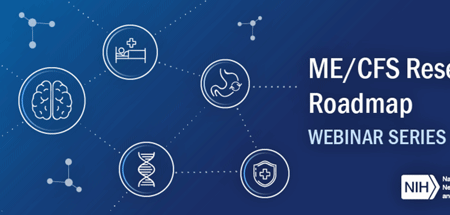

An Interesting Time for ME/CFS at the NIH
National Institutes of Health (NIH) Conferences on ME/CFS are rare events – the last one was four years ago. They’re important in several ways – for one, because they have the imprimatur of the NIH, they’re more likely to attract a wide audience – and the kind of audience we want: NIH researchers and bureaucrats, among others.
The Conference, “Advancing ME/CFS Research: Identifying Targets for Intervention and Learning from Long COVID“, is the first one, of course, to happen since the coronavirus pandemic triggered millions of cases of long COVID and swept chronic fatigue syndrome (ME/CFS) to new levels of recognition.

The Roadmap webinars are part of the strategic plan effort for ME/CFS at the NIH.
It’s occurring during a time when ME/CFS’s visibility at the NIH is especially high. Vicky Whittemore and others (I am a small part of that) have worked to develop a strategic plan for ME/CFS at the NIH. NINDS Director Walter Koroshetz and Vicky initiated the strategic plan effort for ME/CFS several years ago. These plans – always developed by the NIH in-house – are designed to boost a disease’s standing and ultimately result in more funding and resources. That effort, like so many others, got temporarily derailed by the pandemic but is now culminating in a series of webinars. Three Roadmap webinars are left – Physiology, Shared Illnesses and Circulation.
With the conference and the webinars, ME/CFS is getting more visibility at the NIH than it has in many years. It’s an interesting time. While visibility and acceptance and interest in ME/CFS is arguably higher than at any time in the past, NIH funding for ME/CFS in the current year is down, and several Institutes withdrew their support for the latest round of NIH-funded ME/CFS research centers.
Thankfully, the immune and neurological institutes (NIAID and NINDS) increased their support. (Let’s give a shout-out to Dr. Koroshetz and NINDS for providing the bulk of the funding for the research centers (3 x as much as NIAID). Without his and NINDS support, there would be no research centers nor a strategic plan.
It cannot be stressed too highly how important it is that the NIH get more fully engaged in ME/CFS. We recently saw what real engagement from the NIH looks like when a National Heart Lung and Blood Institute (NHLBI) research team turned a curious finding from one ME/CFS patient into an in-depth research effort. That effort, which extended to using animal models, uncovered a new mitochondrial abnormality and has already led to the possibility of clinical trials.
Yes, one study led to the possibility of a clinical trial. That’s how quickly things can happen when researchers have the resources to chase down findings. (In other places, we would have probably been on a ten-year timeline.) Plus, the effort was completely unexpected given the miserly NHLBI support for ME/CFS over time and its decision to not provide even minimal funding for the ME/CFS research centers. When NHLBI researchers uncovered a promising finding, though, they went after it full bore.
The possibilities for rapid movement forward are simply too enticing for us ever to give up on the NIH.

The conference will communicate the many research opportunities present in ME/CFS.
The Conference
With one of its rare ME/CFS conferences looming, each of us has a chance to bolster ME/CFS standing simply by registering for the conference and popping in. The NIH counts everything and it will be counting how many people tune in as an indication of community interest. There’s no doubt that scientific conferences are cognitively very demanding. Just by registering for the conference, though, then popping in, you can support the effort to get the NIH more involved. The conference, by the way, is free and runs from Dec. 12-13th.
You have to register by Dec. 5th, though, to watch the conference online or attend in person.
Register for the Conference Here!
This conference also provides a novel feature. In an effort to present the human face of ME/CFS, the organizers (I was part of the effort) scattered short “lived experiences” talks by ME/CFS patients throughout the conference.
Highlights From The Conference
Note the title, “Advancing ME/CFS Research: Identifying Targets for Intervention and Learning from Long COVID“. The organizers wanted to emphasize potential targets for intervening in ME/CFS and make clear the opportunity ME/CFS research has for long COVID and vice versa. Some talks on long COVID, therefore, are scattered throughout the conference.
Mark Davis – Stanford – Presentation Title Coming…
One of the most intriguing presentations is also one of the most mysterious. Some may remember that Stanford immunologist Mark Davis and Ron Davis were, in 2018, able to garner a rare, full-fledged, multiyear RO1 NIH to study T-cells. The work seemed to hit a wall at one point, but Mark Davis recently reported that he had something to share – so here we are!
The conference isn’t done with T-cells, though. A member of Maureen Hanson’s lab, Jessica Maya, will talk on ““Investigating T cell populations for immune cell dysfunction in ME/CFS”.
Insights and Foresights into the Microbiology and Immunology of ME/CFS” – Ian Lipkin
Next up, Ian Lipkin! Lipkin led one of the three NIH ME/CFS research centers, but we have not heard much from him lately. With all the pathogen work going on in long COVID, the noted pathologist, though, should have plenty to add. We’ll see what “foresights” Lipkin has about ME/CFS and pathogens in “Insights and Foresights into the Microbiology and Immunology of ME/CFS”.
Clinical Phenotypes of Long-COVID, pathophysiological mechanisms and
intervention” Avi Nath (NINDS)
We always want to hear from Avindra Nath, but what we really wanted to hear from him was the results of his ME/CFS intramural study – and he’s remaining close-mouthed on that, apparently, as we await publication. It’s disappointing, for sure, but Nath always has interesting insights on these diseases and he’s fully embedded in long-COVID research…
We have no title for Andrew Grimson’s talk, but what we do know is that Grimson’s recent study which buttonholed monocytes as potentially the key to the immune dysfunction was rather jaw-dropping. Nobody in 20 years has been looking at monocytes/macrophages, but they’re showing up big time in long COVID and they showed up big time in Grimson’s impressive NIH-funded study.
Metabolism, Energy, and Exercise
Metabolism, energy and exercise studies seem to strike at the core of ME/CFS and, as far as I’m concerned, you can’t have too many of these studies.
Karl Johann Tronstadt is a mitochondrial researcher who recently found ME/CFS patients exhibited “cellular energy strain“. We’ll learn more about his latest work when he talks about “Metabolic Insights in ME/CFS: Phenotypes and Underlying Mechanisms“.
Paul Hwang is the NHLBI researcher who made headlines with his discovery of a dysfunctional WASF3 protein in ME/CFS. In “WASF3 may mediate bioenergetic deficiency in ME/CFS”, he will talk about the hottest recent finding in ME/CFS, and hopefully about his efforts to get a clinical trial underway.
In an always welcome exercise AND metabolomics study, Xiaoyu Che, a member of Ian Lipkin’s team, will talk on “Comprehensive plasma metabolomic analysis in ME/CFS with exercise tolerance“.
The Brain
It really could all start in the brain. Nicholas Hampilos from Cornell has been working with Dikuma Shungu on oxidative stress in the central nervous system. Shungu has found dramatic reductions in brain antioxidants which could set the stage for neuroinflammation in ME/CFS. Hampilos will add to Dane Cook’s findings on the effect of exertion on the brain in his talk on the “Effect of Physical Exertion on CNS Oxidative Stress and Metabolism in ME/CFS”.
What we really want to do is cement, if possible, the similarities between ME/CFS and long COVID, and that’s what we may (or may not) get with “Structural and Oxygen Metabolic Magnetic Resonance Imaging of long-COVID and ME/CFS” by Xiang Xu. Xiang Xu has been developing more advanced MRI techniques and has been engaged in one of the first ME/CFS and long-COVID brain imaging studies. Her study will help answer whether the brain issues in long COVID:
“are essentially the same as those with non-COVID ME/CFS…and whether (the) energy failure is present in (both diseases) and whether the two diseases “should be evaluated and treated similarly. If so, (they conclude) this group of COVID-related patients could inform us about the features and mechanisms of ME/CFS in general.”
Alain Moreau will hit both diseases in his “Contribution of Epigenetics in ME/CFS and Long COVID Pathogenesis” talk.
So will Hannah Bues in her “Using [11C]PBR28 positron emission tomography to assess neuroinflammation in ME/CFS and PASC”. It’s still surprising how few neuroinflammation studies we have in ME/CFS. The notable thing about this one – other than the fact that it’s comparing ME/CFS and long-COVID patients – is that it’s using an updated, more accurate binding agent. Given how many people have bet that neuroinflammation is playing a major role in ME/CFS, it’ll be interesting to see what Bues (who is also working with Michael Van Elzakker on a long-COVID neuroinflammation study) has found.
Of course, no one has done more to advance the idea of neuroinflammation in ME/CFS than the uber-creative Jarred Younger and his brain thermography (temperature) studies. Not only will Younger talk about that, but he will also be talking about another favorite topic – how to treat it in his “Brain inflammation in ME/CFS: How we measure it and how we might treat it” talk.
The conference, then, is full of interesting and potentially important talks. 🙂
Register for the Conference Here!
Health Rising’s BIG (little) End of the Year Donation Drive Update

We don’t just report the facts – we bring the context learned from decades exploring these illnesses.
Thanks to the approximately 100 people who have contributed to Health Rising. You can see how we work from this blog. We don’t just note the talks – we give some background, some context. (That’s what you get from 20 years of following the research :)). If that floats your boat and you want to see more of that, please support us in a way that works for you.






This looks so good. I’ve registered, as a vitual attendee. So it seems to be open to an international audience.
Yep. Anyone anywhere so far as I can tell.
Thank you, as always, for your well-written article. I recognize the time that must go in to explaining complex ideas in a way that many can make sense of. You and your work are very much appreciated!
I have registered for the conference and will attend virtually.
Thanks very much, Tim!
I registered! And shared it on international social media sites to hopefully get a few more attendees
I am always looking forward to hearing from the researchers who will be presenting at the NIH conference.
However, I have no confidence in the NIH at all.
At the 2019 “Accelerating ME/CFS Research” the NIH failed to fund the most promising advances like the Nanoneedle – going so far as to ask Esfandyarpour et al not to apply – and they also decreased our funding rather than increasing it.
Clearly, the NIH doesn’t know what words actually mean.
What our disease needs most is a biomarker so we can tie to therapeutics and get FDA approval. It was the game changer for HIV, and it would be the game-changer for ME/CFS .
So where is the ME/CFS Biomarker Roadmap laying out what we know, and what research priorities the NIH needs to set to get us a biomarker? Why is it missing?
I always look forward to your writing, Cort, since it’s written so optimistically but it always sets us up for a big fall.
ME/CFS is only funded .04 of disease burden under Dr Koroshetz and Dr. Whtitemore.
A 3.7 Million dollar grant for a Non-MECFS project for cancer is funded under Dr. Koroshetz and Dr. Whittemore.
If Dr. Monica M. Bertagnolli is serious about “nothing about us without us” then she will:
– house ME/CFS under the Director’s Office
– fund ME/CFS 600 million dollars a year
– Call for the immediate funding of ME/CFS diagnostic marker
– Call for a ME/CFS definition and protocol to be used across the board.
– She will sit down with Dr. Ron W Davis and Dr. Amy Proal and figure out how to Solve ME/CFS on a good budget with good science.
But none of those things that need to happen, will happen at the Conference.
Neither Koroshetz, Whittemore, or Nath are friends to people with ME/CFS. If they were all of the above things would have happened already and 3.7 Million dollars of ME/CFS money would have gone to a Ron Davis instead of a non-ME/CFS project.
OK! Some counterpoint 🙂
Agreed on lousy funding from NIH – I’ve been writing about that, well, for decades. Even with that, though, they are still easily, EASILY, the biggest funder of ME/CFS research. Think about that – even while neglecting this disease horribly – they’re still funding more research than anyone else. That’s why – recognizing what we’re up against with them – we can’t give up on them either – the potential is too large.
They didn’t fund the nanoneedle study (darn!) but they are funding Younger’s neuroinflammation and Good day/bad day study, Mark and Ron Davis’s T-cell study, Hanson’s rather amazing forays into exercise, metabolomics and proteomics, Grimson’s genetic monocyte work, Natelson’s brain and metabolomic work, Ian Lipkin’s pathogen work, Cosgrove’s muscle-immune study, Selin’s T-cell exhaustion work, Ariza’s EBV duATPase work and more.
These are all major studies – and the NIH is funding them with one hand tied behind its back and by using its little pinkie finger. If it can do that – think what it can do when it really tries. I hope Ron will get more funding – I dearly wish he had a nice big fat NIH funded ME/CFS research center – but these are also all good researchers.
I hope that Bertagnolli will shake things up. I have a feeling that consensus is more important than anything else at the NIH, though. Still – we deserve a big boost.
Will they be recording the whole conference like the webinars? If so, Cort can you please post a link to them? I am registered virtually but have conflicts during parts of those two days.
Yes, they are 🙂 I’ll cover them and post a link.
Thank you for posting conference to view later. By the time I saw this announcement, it was past dec 5.
Cort, thank you for being there for us!
Hello, Cort! I missed this announcement and this the conference. Would you happen to know if this was recorded and will it be shared?